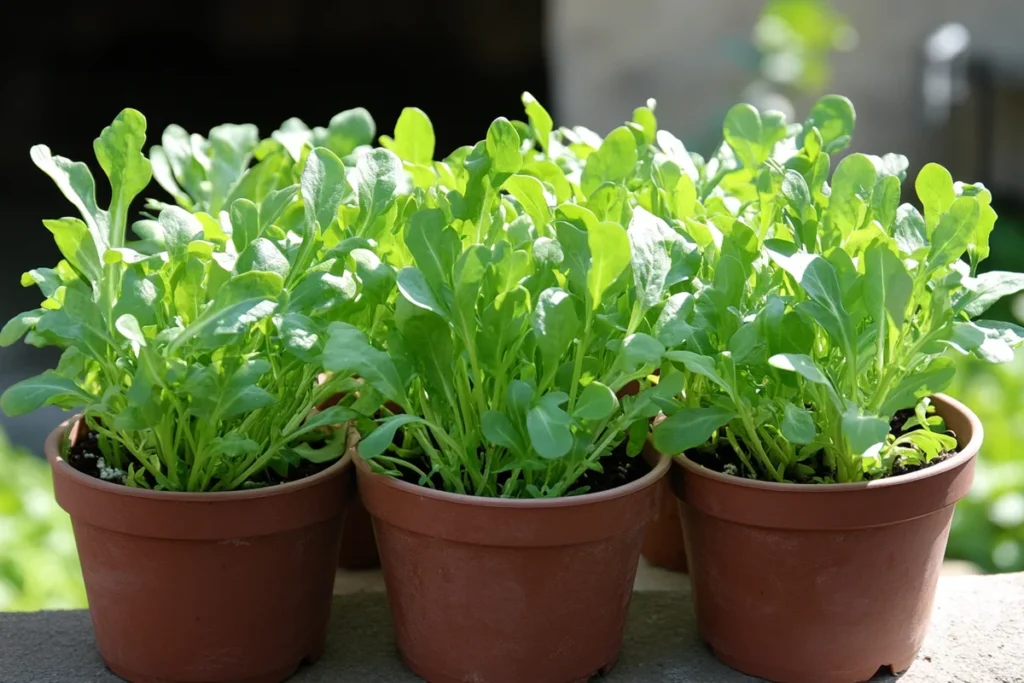Introduction
When it comes to fresh, healthy, and versatile greens, rocket salad—also known as arugula—stands out for its vibrant flavor and nutritional punch. Originating from Mediterranean cuisine, this peppery green has become a staple in kitchens worldwide, loved for its unique taste and adaptability. From its historical roots to its place in modern diets, rocket salad isn’t just another leafy green; it’s a culinary delight packed with health benefits.
In this article, we’ll explore everything you need to know about rocket salad, including its fascinating history, its nutrient-dense profile, and creative ways to incorporate it into your meals. Additionally, we’ll delve into how to grow, store, and serve this green to maximize its freshness and flavor. So, whether you’re a seasoned salad enthusiast or a beginner looking to elevate your dishes, this guide will inspire you to make rocket salad a regular part of your meals.
What is Rocket Salad?
Origins and History of Rocket Salad
Rocket salad, or arugula, has a history as rich as its flavor. This green was first cultivated in the Mediterranean region, where it was treasured not only as a food ingredient but also for its medicinal properties. Ancient Romans believed it to be an aphrodisiac and a tonic for digestion. Fast forward to today, and this peppery delight has become a global sensation, making appearances in everything from gourmet dishes to simple home-cooked meals.
The journey of rocket salad from local Mediterranean farms to tables around the world showcases its versatility and cultural significance. Its distinct, spicy flavor became a favorite ingredient in Italian cuisine, especially in pasta, pizza, and, of course, salads. In recent years, the Western world has embraced this leafy green for its health benefits, adding it to smoothies, soups, and even sandwiches.

What Makes Rocket Salad Unique?
So, what sets rocket salad apart from other leafy greens? For starters, its taste is a showstopper. With a peppery, slightly bitter bite, rocket adds an unexpected twist to recipes. The texture is equally appealing—soft, yet sturdy enough to hold its own alongside robust ingredients like nuts, cheese, or grilled vegetables.
Moreover, rocket leaves are incredibly versatile. You can enjoy them raw in salads, sautéed as a side dish, or even blended into pesto. Its adaptability and ability to complement both mild and bold flavors make it a standout ingredient. The fact that it’s nutrient-dense and low in calories only adds to its charm, making it a go-to option for health-conscious eaters and foodies alike.
From its ancient origins to its modern-day popularity, rocket salad has proven it’s more than just a garnish—it’s a culinary treasure with a personality as bold as its taste.
Why Is Rocket Salad a Superfood?
Nutritional Profile of Rocket Leaves
Rocket salad isn’t just a burst of flavor; it’s a powerhouse of nutrition that packs a lot into its tiny leaves. For starters, these greens are rich in essential vitamins like A, C, and K, which are vital for your skin, immune system, and bone health. Plus, they’re loaded with folate, an important B vitamin that supports cellular function and is especially beneficial for expectant mothers.
Beyond vitamins, rocket is also a great source of minerals like calcium, potassium, and magnesium. These nutrients play a critical role in maintaining healthy bones, regulating blood pressure, and even supporting muscle function. And let’s not forget about its fiber content—it aids digestion and keeps you feeling full longer, making it an excellent addition to a weight-management plan.
Another standout feature of rocket salad is its low-calorie profile. With just about 25 calories per 100 grams, it’s a guilt-free choice for anyone watching their calorie intake. What’s more, its high water content keeps you hydrated while adding bulk to your meals without weighing them down.
Health Benefits of Rocket Salad
Promotes Heart Health
Rocket is packed with antioxidants, including beta-carotene and vitamin C, which help reduce oxidative stress and inflammation in the body. These compounds are known to improve heart health by protecting blood vessels and lowering bad cholesterol (LDL) levels. Potassium, a mineral found in abundance in rocket, further supports cardiovascular health by regulating blood pressure and preventing hypertension.
Improves Digestion
If your digestive system could use a boost, rocket salad might be the perfect solution. Its high fiber content promotes healthy bowel movements and prevents constipation. Plus, the enzymes and phytonutrients in rocket can aid in breaking down heavy foods, reducing bloating and discomfort after meals.
Rich in Antioxidants
One of rocket’s most impressive health benefits comes from its antioxidants. These compounds help fight free radicals, which are unstable molecules that can damage your cells and accelerate aging. Antioxidants in rocket, such as glucosinolates and flavonoids, are also thought to have cancer-fighting properties. Research suggests that regular consumption of rocket may help reduce the risk of certain cancers, including lung and stomach cancers.
Supports Bone Health
Thanks to its high vitamin K content, rocket salad is a boon for your bones. Vitamin K plays a pivotal role in calcium absorption, ensuring that your body retains this essential mineral to build and maintain strong bones. A single serving of rocket can provide more than 50% of your daily vitamin K requirement, making it an excellent choice for anyone looking to improve their bone density and reduce the risk of osteoporosis.
Rocket Salad Calories and Weight Loss Benefits
Looking for a low-calorie, nutrient-dense food to support your weight loss journey? Rocket salad ticks all the boxes. Its low energy density means you can enjoy large portions without consuming excessive calories. Plus, its fiber and water content make it highly satiating, curbing those pesky hunger pangs that lead to overeating.
It’s no wonder rocket salad is often featured in clean eating and detox meal plans. Not only does it help you feel full, but it also provides the essential nutrients your body needs to stay energized and healthy throughout the day.
Pro Tip
For a deeper dive into the nutritional value of rocket leaves, visit USDA FoodData Central to explore detailed nutritional facts about rocket salad and its health benefits!
Different Varieties of Rocket Leaves
Wild Rocket vs. Cultivated Rocket
When it comes to rocket salad, not all greens are created equal. You’ll find two main types: wild rocket and cultivated rocket. While they might seem similar at first glance, there are notable differences that set them apart.
Wild rocket (Diplotaxis tenuifolia) has a more intense, peppery flavor, making it a favorite for those who love bold tastes. Its leaves are typically narrower, darker, and have a slightly jagged appearance. This variety is often used in Mediterranean dishes, where its robust flavor pairs beautifully with sharp cheeses and citrusy dressings.
On the other hand, cultivated rocket (Eruca vesicaria), which is more commonly found in grocery stores, has a milder taste and a slightly broader leaf structure. It’s a great choice for those who prefer a subtler flavor or are just beginning to explore the world of peppery greens. Its versatility makes it ideal for salads, sandwiches, and even pasta dishes.
Baby Rocket vs. Mature Rocket
Another way to distinguish rocket leaves is by their stage of growth. Baby rocket leaves are tender, delicate, and less bitter, making them a crowd-pleaser for those who enjoy lighter, milder greens. They’re often used in salads where their softness balances out crunchier ingredients like nuts or croutons.
Mature rocket leaves, on the other hand, have a more robust texture and a pronounced bitterness. These are perfect for cooking or blending into dishes where the flavor can be balanced with other ingredients. For example, mature rocket is excellent when sautéed with olive oil and garlic or blended into a pesto for a bold, herbaceous twist.
Best Rocket Leaves for Salad
So, which type of rocket leaf should you choose for your salad? That depends on your preferences! If you enjoy a fresh, peppery kick, opt for wild or mature rocket leaves. Their bold flavors can hold their own in salads with strong ingredients like Parmesan cheese, cherry tomatoes, or balsamic vinegar.
For those who prefer a milder, more delicate base, baby rocket leaves are the way to go. They pair wonderfully with light dressings and sweet additions like sliced pears, strawberries, or candied walnuts. No matter the variety, rocket salad is a versatile canvas that adapts to your personal taste and culinary creativity.
Rocket Leaves: A Global Favorite
From the Mediterranean coastline to kitchens worldwide, rocket has earned its place as a beloved ingredient. Whether you’re enjoying the wild variety in a traditional Italian dish or adding baby rocket to a quick weeknight salad, this leafy green delivers on both flavor and nutrition. It’s no wonder that rocket continues to win over taste buds across the globe!
How to Grow and Store Rocket Leaves

Growing Rocket Leaves at Home
Rocket leaves are not just a delight in the kitchen—they’re also surprisingly easy to grow. Whether you have a spacious garden or a small balcony, this resilient green thrives in a variety of environments. With a little care and attention, you can enjoy fresh, homegrown rocket salad anytime.
Ideal Growing Conditions
Rocket thrives in mild climates with temperatures ranging between 10°C and 20°C (50°F–68°F). It prefers well-draining, slightly sandy soil that is rich in organic matter. Rocket loves sunlight, but it also tolerates partial shade, making it perfect for urban gardeners or those with limited outdoor space.
One important thing to remember is that rocket leaves grow best in cooler seasons, such as early spring or autumn. When grown in hot, dry conditions, the plant tends to bolt (flower and go to seed), which can make the leaves more bitter.
Step-by-Step Growing Guide
- Planting Seeds: Sow rocket seeds directly into the soil or a container. Scatter the seeds thinly, and cover them with about half an inch of soil. Keep the soil moist but not waterlogged.
- Spacing: Thin the seedlings to about 15 cm (6 inches) apart to allow enough room for growth. Rocket grows quickly, so you’ll see sprouts within a week or two.
- Watering: Water regularly to keep the soil consistently moist, especially during dry spells. Avoid overwatering, as it can lead to root rot.
- Maintenance: Remove weeds regularly and fertilize with compost or organic matter every few weeks to boost growth.
- Harvesting: Begin harvesting when the leaves are about 10–15 cm (4–6 inches) long. Use scissors or pinch the leaves off gently, and avoid uprooting the plant so it can continue to grow.
Common Issues When Growing Rocket
Although rocket salad is a hardy plant, it’s not immune to challenges. Keep an eye out for pests like aphids and flea beetles, which can damage the leaves. Natural remedies like neem oil or a simple mixture of water and dish soap can help deter these unwelcome visitors.
Additionally, watch for signs of powdery mildew, a fungal disease that thrives in damp conditions. To prevent this, ensure good air circulation around the plants and avoid overhead watering.
Storing Rocket Leaves for Maximum Freshness
Proper Washing and Drying Techniques
Once you’ve harvested or bought fresh rocket leaves, handling them correctly is essential to preserve their flavor and texture. Start by rinsing the leaves under cold, running water to remove dirt and debris. Use a salad spinner to dry them thoroughly, as excess moisture can lead to quicker spoilage.
Best Storage Practices
For short-term storage, wrap your washed and dried rocket leaves in a paper towel and place them inside an airtight container or a resealable plastic bag. Store this in the vegetable crisper of your refrigerator. This method can keep the leaves fresh for up to 5–7 days.
If you want to store rocket salad for a longer period, freezing is an excellent option. Blanch the leaves in boiling water for about 30 seconds, then transfer them to an ice bath to stop the cooking process. Once cooled, pat the leaves dry, place them in a freezer-safe bag, and store them in the freezer. Frozen rocket is best used for cooking, as it may lose its crisp texture when thawed.
Rocket leaves are not just easy to grow and store—they’re also incredibly rewarding. Whether you enjoy tending to them in your garden or keeping a stash of fresh leaves in your fridge, the joy of having this vibrant green at your fingertips is unbeatable. For detailed growing tips and tricks, check out Gardening Know How.

Frequently Asked Questions About Rocket Salad
What is rocket salad called in the US?
In the United States, rocket salad is commonly known as arugula. The term “arugula” is derived from the Italian word arucola, which refers to the same peppery green. While the name differs, the plant itself remains identical, and it’s widely used in American cuisine as a fresh, flavorful addition to salads, sandwiches, and pasta dishes.
Is rocket salad the same as arugula?
Yes, rocket salad and arugula are the same plant. The difference in terminology comes down to regional preferences. In the UK, Australia, and many other parts of the world, the plant is referred to as “rocket,” while in the US and Canada, it’s called “arugula.” Regardless of the name, this leafy green’s peppery, slightly bitter flavor remains its signature trait, and it’s celebrated in cuisines worldwide.
What is a rocket in a salad?
In the context of a salad, rocket refers to a type of leafy green with a distinctive peppery taste. It’s a member of the brassica family, which also includes kale, broccoli, and cabbage. Rocket is prized for its versatility—it can serve as the base of a salad, act as a garnish, or complement other greens with its bold flavor. Combined with ingredients like tomatoes, nuts, and cheese, rocket creates a salad that’s as nutrient-packed as it is flavorful.
What do Canadians call rocket salad?
In Canada, rocket salad is most often called arugula, just as it is in the United States. The use of “arugula” reflects North American English, whereas the term “rocket” is more commonly used in British English-speaking countries. Despite the difference in name, arugula remains a popular green in Canadian cuisine, appreciated for its peppery kick and nutritional benefits.
These FAQs clarify the differences in naming and usage of rocket salad worldwide while highlighting its universal appeal. Whether you call it rocket, arugula, or something else, this leafy green continues to shine on plates across the globe.
Why Rocket Salad Deserves a Place in Your Diet
From its ancient Mediterranean roots to its widespread popularity today, rocket salad has proven to be a true culinary gem. Its bold, peppery flavor, coupled with its remarkable health benefits, makes it a standout among leafy greens. Whether you’re drawn to its low-calorie, nutrient-dense profile or its versatility in the kitchen, there’s no denying that rocket salad is more than just a salad ingredient—it’s a lifestyle choice.
This vibrant green offers something for everyone. If you’re a home cook, rocket’s adaptability makes it the perfect base for experimenting with new recipes. Gardeners will love how easy it is to grow and harvest, while health-conscious eaters can reap its many nutritional rewards, from improved digestion to stronger bones.
So why not give rocket salad a prominent place on your plate? Whether you enjoy it raw, sautéed, or blended into your favorite dishes, this peppery delight is guaranteed to elevate your meals and keep your body nourished. Explore, experiment, and embrace the bold flavors of rocket salad—your taste buds and health will thank you!
For more tips on nutrition, gardening, and cooking ideas, don’t forget to check out resources like USDA FoodData Central or Gardening Know How. Enjoy your journey with this delightful green!

